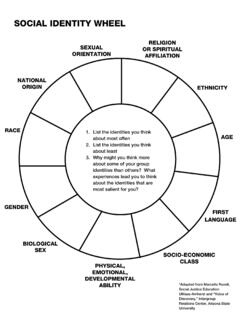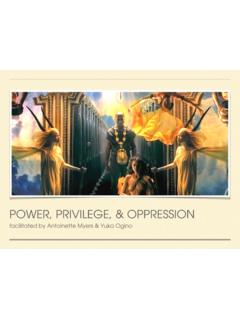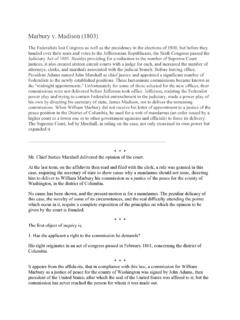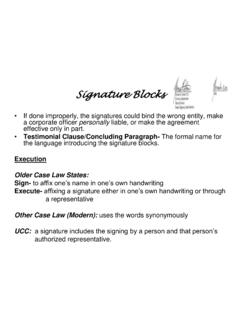Transcription of facilitated by Antoinette Myers & Yuka Ogino - Scripps College
1 POWER, PRIVILEGE, & OPPRESSION facilitated by Antoinette Myers & Yuka Ogino AGENDA Introductions Vocabulary Breakthrough: Power, Privilege, and Oppression BREAK Salient Identities/Social Identity Wheels Cycle of Oppression BREAK What Can You Do For Scripps ? Discussion/Debrief Evaluations & Closing INTRODUCTIONS Fill out your name tag. Please include your pronouns! Example: Jordan Genderbread (she/her/hers, they/them/theirs) Meet Antoinette ! Meet each other! LEARNING OUTCOMES Participants will have had an opportunity to discuss openly topics of race, class, ability, religious oppression, and power/privilege in a staff-only space. Participants will learn specific vocabulary used on campuses and within academia to describe a multitude of everyday life experiences and perspectives.
2 Participants will be educated on microaggressions in order to reduce and attempt to eliminate the racist, classist, sexist, heterosexist, ableist, and privileged attitudes on our campus (from the Strategic Plan). Participants will be able to engage in meaningful conversations with their colleagues around multiple topics and learn about multiple perspectives in a brave space. Anything else? What are you hoping to do here? GROUND RULES/BRAVE SPACE The Vegas Rule: Learning leaves and the names/stories stay here. Share the air Challenge yourself to be respectful of all each other's feelings, perspectives, abilities, and identities (and your own) Remember it s not just the intent that matters, but also the impact Be the expert of your experience, use "i" statements Be okay with silence Leave space for processing and after-processing, both inside and outside of the space (aka take care of yourself) Reserve the right to change your mind Is there anything you d like to add?
3 PART ONE: ENHANCING OUR VOCABULARY MATCHING GAME Orientation social identity used interchangeably with biological sex in a system that presumes if one has male characteristics, one is male, and if one has female characteristics, one is female. system of ordering a society in which people are divided into sets based on perceived social or economic status. system that maintains advantage and disadvantage based on social group memberships and operates, intentionally and unintentionally, on individual, institutional, and cultural levels. s natural preference in sexual and/or romantic partners. category that describes membership to a group based on real or presumed common ancestry, shared languages and/or religious beliefs, cultural heritage and group history.
4 Sense of self, providing sameness and continuity in personality over time; the condition of being oneself and not another. access to resources only readily available to some people as a result of their advantaged social group membership. socio-historical category used to divide people into populations or groups based on physical appearance, such as skin color, eye color, hair color, etc. ability to decide who will access to resources; the capacity to direct or influence the behavior of others, oneself, and/or the course of events. Group _____ social identity used interchangeably with biological sex in a system that presumes if one has male characteristics, one is male, and if one has female characteristics, one is female.
5 System of ordering a society in which people are divided into sets based on perceived social or economic status. system that maintains advantage and disadvantage based on social group memberships and operates, intentionally and unintentionally, on individual, institutional, and cultural levels. s natural preference in sexual and/or romantic partners. category that describes membership to a group based on real or presumed common ancestry, shared languages and/or religious beliefs, cultural heritage and group history. sense of self, providing sameness and continuity in personality over time; the condition of being oneself and not another. access to resources only readily available to some people as a result of their advantaged social group membership.
6 Socio-historical category used to divide people into populations or groups based on physical appearance, such as skin color, eye color, hair color, etc. ability to decide who will access to resources; the capacity to direct or influence the behavior of others, oneself, and/or the course of events. Orientation PART TWO: BREAKING IT ALL THE WAY DOWN Malcolm X Power in defense of freedom is greater than power in behalf of tyranny and oppression, because power, real power, comes from our conviction which produces action, uncompromising action. ON POWER UNDERSTANDING POWER Social group: A group of people who share a range of physical, cultural, or social characteristics within one of the social identity categories.
7 Examples of social identity categories: Sex: Female, male, intersex Class: Owning class, working class, poor, middle class Sexual orientation Lesbian, gay, heterosexual, bisexual Physical, developmental, and psychological ability Able-bodied, disabled, mental illness Race Black, White, Latin@, Native American, Asian, biracial, multiracial Religion Jewish, Christian, Muslim, Buddhist, Hindu Age Elders, young people, adults Gender Women, Men, genderqueer, transgender Ethnicity Irish, Dominican, German FOCUSING INWARDS: ON SALIENT IDENTITIES Take a few moments to think about your own identities. Which social groups do you belong to? Salient identities are the identities that come into play in different situations.
8 Reflect on the following questions to yourself: Which of your social group memberships were easiest to identify? Which of your social group memberships were most difficult to identify? What questions are raised for your about your social group memberships? In your group: Talk about how this worksheet might have enabled you to think about yourself in new ways. DYNAMICS OF SOCIAL GROUPS Social statuses: Within each social identity category, some people have greater access to social power and privilege based on membership in their social group. Often, this group is called the advantaged group. We call group who access to social power is limited or denied, the targeted group.
9 When you hear students or colleagues use the following terms in official paperwork or even in community conversation: Advantaged: agent, dominant, oppressor, privileged Targeted: target, subordinate, oppressed, disadvantaged Social groups are afforded different status in the United States based on multiple historical, political, and social factors. This affects the abilities of people in different groups to access resources Most of these differences and identities are socially constructed Social construction: taken for granted assumptions about the world, knowledge, and ourselves assumed to be universal rather than historically and culturally specific ideas created through social processes and interactions.
10 TALKING ABOUT POWER AT Scripps What does it mean to have power at Scripps ? When you hear that others feel as though they are second-class citizens , what do you think that means? If you are feeling unempowered at Scripps , why might that be? If your colleague feels unempowered, how can you support them? What does a balance of power look like on campus? BALANCING POWER Using racial justice as an example of balancing power: Racial Justice diversity Diversity = variety Racial Justice Equality Equality = sameness Racial Justice = equity Equity = fairness, justice People get what they need Peggy McIntosh Privilege exists when one group has something of value that is denied to others simply because of the groups they belong to, rather than because of anything they ve done or failed to do.








